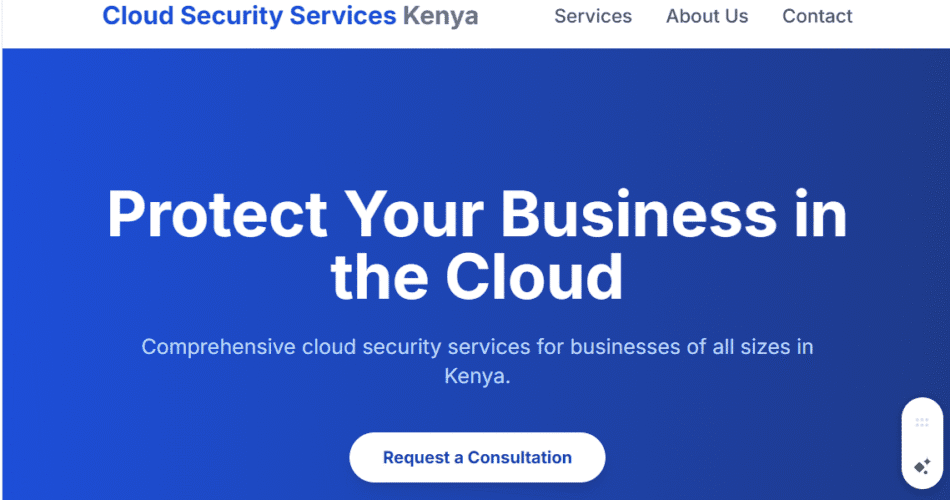Cloud Security Services Kenya
- Delivery Time2 Weeks
- English levelProfessional
- LocationUSA, United Kingdom, United Arab Emirates, New York, Nairobi, Kilimani, Kenya, Dubai, CBD Nairobi, Canada, Australia
Service Description
The cost of cloud security services in kenya is 250000KES.Get cloud security services in kenya at a price of 200000KES at Black Shepherd Technologies.
Protect your business in Kenya from evolving cyber threats with comprehensive cloud security services. Our solutions offer advanced data encryption, robust access controls, continuous threat monitoring, and compliance management to secure your data and applications in any cloud environment. Safeguard your digital assets and ensure business continuity with expert-led cloud security assessments, managed services, and incident response tailored to your needs.
As businesses in Kenya increasingly embrace the digital transformation and migrate their operations to the cloud, the need for robust cloud security has become paramount. Cloud security is a specialized field of cybersecurity focused on protecting data, applications, and infrastructure within cloud computing environments. While major cloud providers like Amazon Web Services (AWS), Microsoft Azure, and Google Cloud Platform (GCP) offer built-in security features, the ultimate responsibility for securing data and applications often falls on the user, as highlighted by the shared responsibility model. This is where professional cloud security services become crucial for Kenyan businesses.
The cloud security landscape in Kenya is dynamic, with a growing number of local and international companies offering a wide range of services to address the unique challenges of the region. These services are designed to protect against an array of cyber threats, including ransomware, data breaches, distributed denial-of-service (DDoS) attacks, and insider threats. Key service offerings generally fall into several categories:
1. Cloud Security Posture Management (CSPM) and Assessments: Many companies start with a comprehensive assessment of their cloud environment. This involves an in-depth review of existing security configurations, identifying vulnerabilities, and ensuring compliance with local and international regulations like the Data Protection Act, GDPR, and ISO 27001. These assessments are vital for uncovering misconfigurations—a leading cause of cloud breaches—and providing actionable strategies to improve an organization’s security posture. Services like penetration testing and vulnerability assessments simulate real-world attacks to find and fix weaknesses before malicious actors can exploit them.
2. Identity and Access Management (IAM): A core component of any cloud security strategy, IAM services focus on controlling who can access what within a cloud environment. This involves implementing measures such as multi-factor authentication (MFA), single sign-on (SSO), and role-based access control (RBAC). By enforcing the principle of least privilege, these services ensure that users and devices only have the necessary permissions to perform their tasks, significantly reducing the risk of unauthorized access and data theft.
3. Data Protection and Encryption: Securing data at every stage of its lifecycle is a non-negotiable aspect of cloud security. Cloud security services in Kenya provide solutions for data encryption both at rest (when stored on servers) and in transit (when being transmitted over networks). They also deploy data loss prevention (DLP) tools to monitor, detect, and block the unauthorized movement of sensitive data. This is particularly important for businesses handling a large volume of personal or financial information.
4. Threat Detection and Incident Response: Proactive monitoring is essential for staying ahead of cyber threats. Managed security services offer real-time threat detection and response capabilities, often utilizing Security Information and Event Management (SIEM) solutions. These systems continuously monitor cloud environments for suspicious activity and provide alerts, allowing for rapid investigation and containment of threats. In the event of a breach, incident response and digital forensics teams are on hand to mitigate the damage, preserve evidence, and help the business recover quickly and efficiently.
5. Training and Consultancy: The human element remains a significant vulnerability in cybersecurity. Cloud security companies offer training and awareness programs for employees to educate them on best practices, such as recognizing phishing attempts and secure data handling. Additionally, strategic consultancy services assist businesses in developing a robust cybersecurity framework, creating security policies, and aligning their security strategies with their business goals.
The benefits of engaging a specialized cloud security partner in Kenya are numerous. They provide businesses with access to expert knowledge and advanced tools that might be otherwise inaccessible or cost-prohibitive to develop in-house. These partnerships enable organizations to scale their cloud operations with confidence, knowing their digital assets are protected against the ever-evolving threat landscape. Ultimately, investing in professional cloud security services is not just about protection; it’s about building trust with customers, maintaining regulatory compliance, and ensuring the long-term resilience and continuity of the business in a rapidly digitizing Kenyan economy.The need for specialized cloud security services in Kenya is further underscored by the country’s unique digital landscape. The Communications Authority of Kenya (CA) has reported a significant increase in cyber threats, with hundreds of millions of events detected in recent quarters. These threats, which include ransomware, web application attacks, and system vulnerabilities, are becoming more sophisticated, driven by advancements in AI and the proliferation of IoT devices. This highlights a critical reality for businesses: a basic, one-size-fits-all approach to security is no longer sufficient.
Furthermore, Kenya’s legal and regulatory environment is evolving to address these challenges. The Data Protection Act, 2019, and its associated regulations, have significant implications for how businesses manage data in the cloud. The Act mandates that data controllers and processors implement robust technical and organizational measures to secure personal data. This includes obligations to register with the Office of the Data Protection Commissioner (ODPC), obtain explicit consent for data processing, and have clear policies for data handling. Non-compliance can result in substantial fines—up to KES 5 million or 1% of a company’s annual turnover—and reputational damage. Cloud security services play a vital role in helping businesses meet these requirements, especially concerning data encryption, access controls, and secure data transfers, particularly for cross-border data flows.
In a digital Kenya where cloud adoption is accelerating and cyber threats are growing in volume and sophistication, a proactive and strategic approach to cloud security is no longer a luxury but a fundamental business necessity. The shared responsibility model for cloud security means that businesses cannot simply rely on their cloud providers. Instead, they must actively partner with specialized cloud security services to build a resilient and compliant digital environment. From ensuring adherence to the Data Protection Act to defending against AI-driven attacks, these services provide the expertise, technology, and strategic guidance required to safeguard digital assets, maintain business continuity, and build a foundation of trust with customers and partners. As the government continues to build a robust national cybersecurity framework, businesses in Kenya are now more than ever empowered and expected to take ownership of their cloud security posture, transforming it from a mere technical requirement into a competitive advantage.








